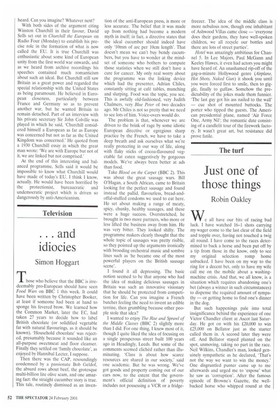. . . and idiocies
Simon Hoggart
Those who believe that the BBC is irredeemably pro-European should have seen Food Wars on BBC 1 this week. It could have been written by Christopher Booker, at least if someone had been at hand to sponge his fevered brow. We learned how the Common Market, later the EC, had taken 27 years to decide how to label British chocolate (or solidified vegetable fat with natural flavourings, as it should be known). 'Household chocolate' was rejected, presumably because it sounded like an all-purpose sweetmeat and floor cleanser. Finally they settled on 'family chocolate', as enjoyed by Hannibal Lecter, I suppose.
Then there was the CAP, resoundingly condemned by a passionate Bob Geldof, the absurd rows about beef, the grotesque multi-billion lire olive scam, and one amazing fact: the straight cucumber story is true. This tale, routinely dismissed as an inven
tion of the anti-European press, is more or less accurate. The belief that it was made up from nothing had become a modern myth in itself; in fact, a directive states that the ideal cucumber should indeed have only '10irun of arc per 10cm length'. That doesn't mean we can't buy bendy cucumbers, but you have to wonder at the mindset of someone who bothers to compute those statistics when we still don't have a cure for cancer. My only real worry about the programme was the linking device which had the presenter, Adrian Chiles, constantly sitting at café tables, munching and slurping. Food was the topic, you see. This is awfully old-fashioned, very Judith Chalmers, very Blue Peter of two decades ago. Mr Chiles is not so pretty that we need to see lots of him. Voice-overs would do.
The problem is that, whenever we are driven to the brink of rage by some idiotic European directive or egregious sharp practice by the French, we have to take a deep breath and ask ourselves what we're really protecting in our way of life, along with flaky sticks of cocoa-flavoured vegetable fat eaten suggestively by gorgeous models. We've always been better at ads than food.
Take Blood on the Carpet (BBC 2). This was about the great sausage wars. Bill O'Hagan, a South African, came to Britain looking for the perfect sausage and found instead the pallid, flavourless, bread-andoffal-stuffed condoms we used to eat here. He set about making a range of meaty, spicy, chunky, healthy sausages, and these were a huge success. Overstretched, he brought in two more partners, who more or less lifted the business away from him. He was very bitter. They looked shifty. The programme makers clearly thought that the whole topic of sausages was pretty risible, so they pointed up the arguments ironically with brooding orchestral music and sombre lines such as 'he became one of the most powerful players on the British sausage scene'.
I found it all depressing. The basic notion seemed to be that anyone who had the idea of making delicious sausages in Britain was such an innovative visionary that he should be protected from competition for life. Can you imagine a French butcher feeling the need to invent an edible terrine, then grumbling because other people stole that idea?
I wanted to enjoy The Rise and Sprawl of the Middle Classes (BBC 2) slightly more than I did. For one thing, I knew most of it, though I quite liked the idea of focusing on a single prosperous street built 100 years ago in Headingly, Leeds. But some of the comments seemed cliched rather than illuminating. 'Class is about how scarce resources are shared in our society,' said one academic. But he was wrong. We've got goods and property coming out of our ears now, to the extent that the government's official definition of poverty includes not possessing a VCR or a fridge
freezer. The idea of the middle class is more nebulous now, though one inhabitant of Ashwood Villas came close — 'everyone does their gardens, they have well-spoken children, we all recycle our bottles and there are lots of street parties'.
Hotel was amazingly ambitious for Channel 5. In Lee Majors, Paul McGann and Keeley Hawes, it even had actors you might have heard of. An unashamed rip-off of the gag-a-minute Hollywood genre (Airplane, Hot Shots, Naked Gun) it shook you until you were forced first to smile, then to giggle, finally to guffaw. Somehow the predictability of the jokes made them funnier. 'The last guy got his ass nailed to the wall' — cue shot of mounted buttocks. The porter who tipped the guests. The American presidential plane, named 'Air Force One, Army Nil'; the romantic date consisting of a candlelit tour of the firework factory. It wasn't great art, but resistance did prove futile.


































































 Previous page
Previous page